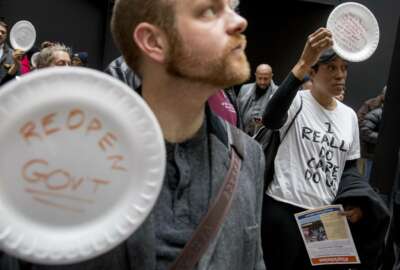Imagine asking for a $100 grant or gift from a charity because you desperately need it. One-hundred dollars — because you really needed it!
Maybe it’s to fill the tank with gas so you could get to a job where you were not getting paid?
Imagine submitting an application for a $1,200 emergency loan because you or a family member had an illness or injury, your house burned down, your rent or mortgage is late or you need to bury one of your parents, or a child. If approved, the check is made out to the creditor and then sent to you. How awful that it is necessary, and how wonderful that it is available.
Since 1986, the Federal Employee Education & Assistance Fund, a feds-helping-feds charity, has given or loaned $8 million to 11,000 feds in need. And that record is likely to be broken as FEEA, with help from some corporate donors, processes thousands of calls from feds who thanks to Washington politicians weren’t paid for more than a month.
FEEA is currently processing tens of thousands of applications for loans until it runs out of money, as it has several times before. But this time the situation is more serious and covers more people. It is not a hurricane or a fire, which can be devastating, but rather a disaster that is bigger and man-made.
The just-concluded record-long 35 day partial government shutdown may have convinced a lot of folks who live, love, vote, eat and work outside the dreaded Beltway that not all government workers are fire-proof time-servers who get better pay and pensions than folks doing similar jobs in the private sector. Washington is fair game, but most Americans don’t have 202, 301, or 703 area codes.
When people in Ogden, Utah; Huntsville, Alabama; Elizabethtown, Kentucky; San Antonio; Minot, North Dakota; and Dayton, Ohio, see the results of a shutdown — some people working without pay while others were not allowed to work — that delays paychecks for a month, it sends a message. It’s one of fairness: Why deny rank-and-file civil servants food and rent money when the fight is between our well-paid, elected politicians of different political persuasions and the White House? Their paychecks continued while the pols wrangled, pouted or plotted how to make the other party take the public relations hit.
The television footage of federal workers and their family members lining up for food in view of the U.S. Capitol building, as well as on Main Street, USA, which also houses Social Security and IRS offices, touched a nerve for a lot of people — maybe. The thought of overworked, stressed out air traffic controllers working without pay must have made plenty of travelers nervous. Longer lines at airport Transportation Security Administration centers were both inconvenient and a little bit scary.
The good news is that private companies with close ties to government workers and federal communities, such as GEICO and BlueCross BlueShield, have once again stepped up with major monetary gifts for the feds fund. And thanks to hustle inside many federal payroll operations, some people got their back pay, or at least one of two checks, just days after the shutdown ended. That’s the good news.
The potentially not so good news is that it could happen again by the middle of this shortest month. You can console yourself by saying it won’t happen again. “It can’t, because ‘they’ couldn’t be that stupid, right?” Seriously.
Nearly Useless Factoid
By Amelia Brust
Lebanon has not conducted a national census since 1932 because of the political sensitivities around religious affiliation, though various groups have made population estimates since then.
Source: JSTOR
Copyright
© 2024 Federal News Network. All rights reserved. This website is not intended for users located within the European Economic Area.
